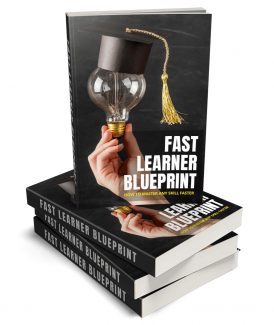 License Type: Master Resell Rights
License Type: Master Resell Rights  File Type: ZIP
File Type: ZIP
 SKU: 64322
SKU: 64322  Shipping: Online Download
Shipping: Online Download
Sample Content Preview
Introduction
No matter how organized we may be, time tends to slip away from us because life moves very fast. It's no surprise that many of us are always interested in shortcuts because we don't have much time to spend on learning a new skill. With all being made so good, these shortcuts do exist and we can learn whatever we want to learn faster by taking advantage of a few actionable strategies. For you to use new information more effectively and get to easily remember something, one skill you must continue to develop is learning.
Though you may have done it all your life and it may not be something that's totally new to you, you can always enjoy the opportunity of being successful every time you learn something new if you follow a systemic series of steps. And, you do have the ability to learn anything faster if you've already learned things like sports, how to cook, a new language, how to drive a car, or any other relative thing.
When you look at some of the skills you’ve learned before, you'll find out that you're not new to learning faster and if you have done it in the past (even though you may not be conscious of how quickly you were able to pick up the skill), you can always learn to do it again. We can now have a firm grasp of how to hold on to information with the knowledge we derive from how our brain works and how we learn — all thanks to neuroscience. In fact, we can now speed up our learning process by making the most out of time. Yes, time is precious and learning does take time, but we must always strive to learn and grow since it's a huge part of life to learn new things.
Today, there are proven ways you can start learning faster. If you're someone who has the intention of becoming the smartest person in the room by getting to know how to retain more and learn faster, this book does help you explore tips on how to become a fast and smart learner with no stress attached.
Chapter 1: Skill, Learning, and Acquisition
Popular author and motivational psychologist, Heidi Grant Halvorson, once said that we must always be getting smarter because being smart is not enough, and one of the keys to success is to be able to learn new skills in this fast-moving, competitive world. Truthfully, in today’s business environment, mastering new skills is a necessity and the words "fast-moving" and "competitive", which describe the nature of the world we live in today, emphasize the little time we have to get things done lest we become stale and shoved far behind.
There are some general rules you can follow, irrespective of the fact that the skill you want to learn and the person who you are will determine your learning technique. Whether you desire to learn how to analyze data, use social media better, or improve at public speaking, you can accomplish your learning goals and gain new insight on how to approach learning new skills when you understand the importance of learning new skills and explore a few tips to learn better and faster.
Why you Should Learn a Skill
Successful people stick to their promise of learning. Rather than vegging out in front of the television, they dedicate their spare time in the pursuit of learning and they stay committed to that. Do you even know that those who are best at learning new skills are those who consistently succeed? If you doubt this, just think of some of the world's most successful people. Without mincing words, learning a new skill is an amazing way to leverage your spare time in the upcoming year. You can enhance your knowledge base, expand your professional networks, and beef up your opportunities for career advancement when you stay committed to learning something new.
Why is it Difficult to Learn a Skill?
One of the beautiful things about difficulties is that they do help us to improve our ability to remember, comprehend, and learn because they facilitate encoding and retrieval of processes and this validates why difficulties are noted to be desirable. Speaking of why people find it difficult to learn a new skill, at times, it's actually a normal thing. It’s not pretty much a big deal because whenever you're embarking on a new thing, it's like setting out for an adventure. Of course, there will be some changes and new connections between neurons because a specific part of your brain is about to get rewired.
Sounds funny or clumsy? Well, it isn't. The simple science is that, when you make things more difficult and challenge yourself, you open yourself up to a new change that may shake you a bit. However, do you ever wonder why some people learn something today and in the next few hours they're blank? Have you ever tried to master something and you feel you're doing great at it until you have to do that thing and you realize that you're blank?
Many of us have experienced this at a point in time and one of the reasons why this happens is because the learning conditions we used were too easy and the simple thing we need to do to overcome this for our subsequent learning is to work on improving our learning by practicing smarter. Identify what works for you and stick to it. You may want to use effective methods such as spaced repetition (increasing your interval between the repetitions when you're first learning something), variation and complexity (checking if your performance can be affected by varying the weather, the rules, the distractions, the environment, the exercises, or other elements — basically, purposely challenging yourself to see your stance), or retrieval.
Before you ask anybody for help, try your best to remember that thing.
How Long Does It Take to Learn a Skill?
Most of us are haunted by the possibility of not doing something better and this thought often prevents us from getting engaged in something new. We have no choice but to quit and find something else to do just to get rid of that feeling of angst. However, one thing we often miss out on is that we don't know that we can benefit from huge increases in a skill when we give in a little persistence while we're experiencing the usual challenges during the early hours of trying something new.
In a very short period, you can experience dramatic improvements if you persist and practice intelligently. Picking up new skills extremely quickly is quite easy for the brain for it's optimized for such a task. Take note that the 10,000 hours of mastering a skill is nothing but an illusion because it takes only 20 hours to move from “knowing nothing to being pretty good”.
Types of Skill
Hard skills (also known as technical skills) and soft skills are the two major types of skills. For optimal performance and advancements in most jobs, both skills are necessary and it's recommended that you possess the two. Speaking of hard skills, these are the skills you gain through any life experience via training or technical knowledge. For example:
- You may be able to speak a new language fluently if you studied a foreign language.
- You may know how to use Microsoft Excel if you've taken an accounting class.
- You may know how to use a point-of-sale system if you’ve worked in food service or retail.
Some of the most in-demand hard skills include:
- Programming languages like Ruby, Java, Python, and Perl
- Storage systems and management
- Marketing campaign management
- User interface design
- Mobile development
- Data mining
- Statistical analysis
- SEO/SEM marketing
- Network security
- Adobe software suite
- Database management
- Bilingual or multilingual
On the other hand, if you're still searching for work, you'll find soft skills to be very essential for your career because they're the traits and personal habits that frame your interaction and work-relation with others and how you work.
- License: Master Resell Rights
- Category:Ebooks
- Tags:2021 Ebooks With Audio Master Resale Rights








